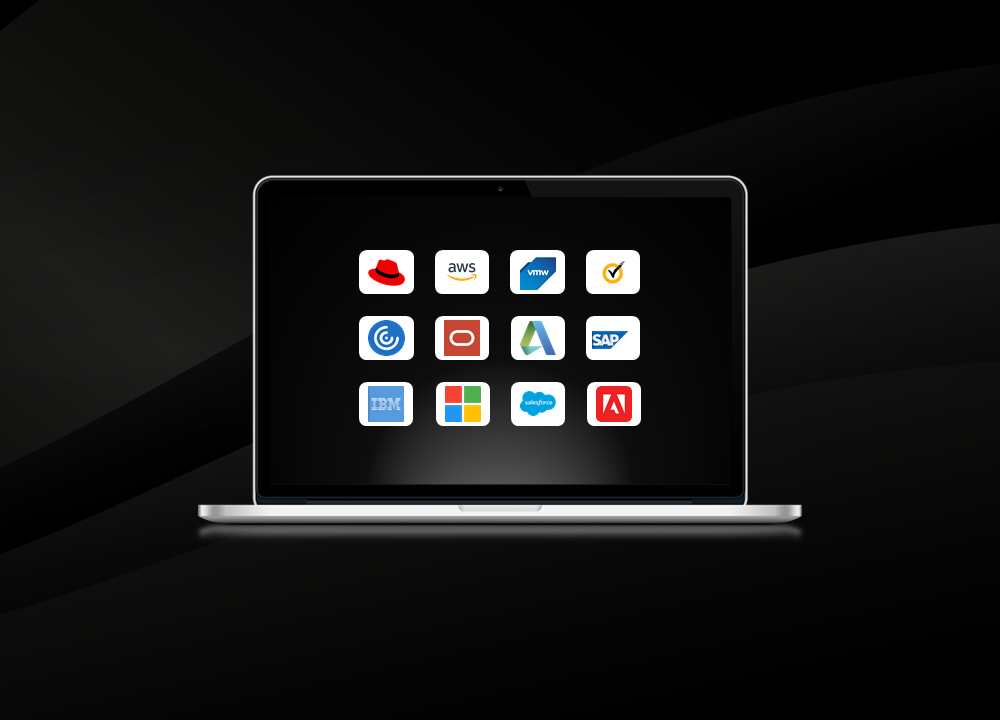
All about software contract negotiations & 10 tips!
Successful software contract negotiation services are a crucial component of your IT organization’s bottom line. But buying the right licenses at the right price is challenging, and it’s only becoming more complex. Software vendors offer ever-changing and complicated terms, and many IT managers do not involve themselves in this on a daily basis, making it difficult to negotiate the most optimal deal. Here are 10 software contract negotiation tips to make the process a little easier.

What is a software contract negotiation?
Do you have a software contract negotiation scheduled soon? Then make good use of our knowledge and tips to ensure you are well prepared. Do research on market conditions and standard terms in your industry, set clear goals, be flexible and use negotiation techniques to strengthen your position. If you are unfamiliar with negotiating contracts, consider seeking professional advice from an independent expert. With these tips in mind, you’ll be ready to successfully negotiate your software contract.
Can I negotiate my software contract?
Yes, you can negotiate the terms of your software contract. It is a good idea to make your own interests and requirements clear to the other party and try to come to a common understanding of what is expected. It may also be helpful to seek help from an independent expert to assist in the negotiation process and to ensure that all important issues are discussed and included in the contract.
Keep in mind that you cannot always get everything you want and sometimes compromises must be made. It is therefore important to be realistic about what is achievable and to strike a good balance between looking out for your own interests and finding a solution that works for all parties.
Difference SaaS and software negotiations?
Yes, there can be a difference between software as a service (SaaS) contract negotiations and regular software contracts. SaaS is a form of software delivery where the software is provided over the Internet and used by customers on a subscription basis, rather than being purchased and installed on a local computer.
SaaS contract negotiations can be different from regular software contracts because there are usually other issues to be discussed, such as how the software is delivered, licensing fees and service and support levels. It is therefore important to be well aware of your organization’s specific requirements and needs and to communicate them clearly during negotiations.
Trusted by government and businesses





SaaS Negotiation Support
We have the knowledge and experience to help you negotiate the best possible terms.
Why should I negotiate my software contract?
There are several reasons why it may be important to negotiate a software contract. Below, I provide some examples:
- Establishing specific requirements and wishes: During negotiations, you can clarify what you expect from the software and how it should function. This can help avoid miscommunication or expectations.
- Defining the scope of the project: Negotiations can help you define and agree on the scope of the project. For example, you can agree on what is and is not included in the project.
- Setting budgets and planning: Negotiations can help you agree on the budget available for the project and the planning for the development and delivery of the software. This can help avoid unexpected costs or delays.
- Establishing responsibilities: Through negotiations, you can agree on the responsibilities of both parties, such as who will be responsible for testing the software or who will maintain the software.
In summary, negotiating a software contract can help create clarity and agree on important aspects of the project, which can help avoid problems and make the project successful.
Preparing contract negotiations
It is important to be well prepared before you begin negotiating a contract. Here are some tips to help you negotiate:
- Do your research: Familiarize yourself with market conditions and standard contract terms in your industry. This can help you make a realistic and reasonable offer.
- Set clear goals: Think about what your main goals are before you start negotiating. This can help you negotiate in a more focused way and avoid giving in too much.
- Be flexible: Be prepared to negotiate on different aspects of the contract, such as the term, compensation and agreements on modifications to the contract.
- Use negotiation techniques: There are several techniques you can use to strengthen your position while negotiating, such as asking for time to think, offering a counterproposal or showing alternatives.
- Seek professional advice: If you are not familiar with negotiating contracts, consider seeking help from an independent expert who has experience negotiating contracts.
Microsoft contract negotiations
There are some important things to consider during a Microsoft Enterprise Agreement contract negotiation, for example:
- Goals: Think about what your main goals are before you begin negotiating. This can help you negotiate in a more focused way and avoid giving in too much.
- Licenses: Discuss how many licenses you need and what products you want to license. Be aware that the number of licenses you buy will determine the price of the contract.
- Term: Consider how long you want the contract to run. A longer term may result in lower prices, but it may also mean that you are bound to the contract for a longer period of time.
- Fee: Discuss the fee you want to pay for the contract. Consider whether you want to pay based on a flat rate or on the number of users.
- Support: Make sure the support offered in the contract fits your needs.
- Changes: Discuss how changes can be made to the contract and how they will be communicated.
- Agreement: Make sure you fully understand the contract before signing it, and make sure all agreements are clearly written down.
10 tips for software contract negotiations
1. Benchmark prices before renewing contracts or buying new software
Software pricing is notoriously inconsistent, which makes it hard to know whether you’re getting a fair deal. It’s not uncommon for two similar companies making similar purchases to pay wildly different prices, sometimes up to a 50% difference! And licensing terms are complex and changeable.
IT price benchmark analysis acts as a safeguard against overspending. When you know what your competitors are paying, you can negotiate for equal or better than best-in-market pricing. Smart managers use benchmarking to avoid excessive costs, keep up with changes in vendor pricing and licensing, and conduct data-driven vendor negotiations.
2. Analyze your use and optimize your software license buy
The most effective savings strategies often occur before negotiations even start. One great example: software license optimization. Many businesses overspend by buying more licenses, subscriptions, or higher-level licenses than they need. To avoid that, you need a clear understanding of the licensing options (including the cost implications of things like virtualization and indirect access) that best fit your particular requirements. If, like most companies, you don’t have vendor-specific expertise in-house, consult independent third-party software licensing experts (like those at Blackbelt XP).
3. Establish procedures about who can communicate with the vendor during software contract negotiations
A team that’s working from a single playbook is essential to strong software license negotiations. Your software buy probably has multiple stakeholders, each with their own goals and communication styles. Software vendors are skilled at exploiting these differences.
That’s why you need internal agreement about procedures before you negotiate. Who is your company’s contact for the vendor? Are other people allowed to communicate with the vendor? If not, how should they communicate their needs to your internal spokesperson? And what should managers do if the vendor attempts to contact them directly? Your vendor has a process for negotiating software license agreements; so should you.
4. Negotiate beneficial contract renewal terms and don’t put renewal off until the last minute
Price is often top of mind when negotiating a software contract, but it’s a mistake to overlook the software renewal terms. Those will determine how much you pay in the future. And vendors know that once your company is locked into a contract, you’re more likely to renew the agreement than go elsewhere. If you don’t pay attention to the renewal terms, you might pay higher rates when you renew. Consider negotiating caps on annual and renewal price increases with your vendor.
Also, think about the terms that apply if you don’t renew a contract. You may need to switch vendors as your needs evolve, and that’s easier if you’ve already negotiated favorable termination and transition assistance clauses that clearly outline responsibilities and support.
And don’t wait until the last minute to renew! Conventional wisdom used to be that waiting until the end of your vendor’s quarter or year was a clever way to force last-minute concessions. But that’s not always true; that busy period for your vendor might make it even harder to reach them and hammer out a favorable contract. Timing can be used as leverage, but be sure you know enough about your vendor to use it to a good advantage.
5. Clarify bundled pricing
Bundled pricing that combines multiple SKUs into a single package is common in software licensing. However, it can make it difficult for you to see what exactly you’re paying for and the value of each item. Bundles are frequently padded with shelfware you will never use but are marketed to you as a ‘free’ addition. That only increases maintenance costs without adding real value.
Clarify what you’re getting (and what you’re paying) by asking vendors for item-level pricing and discounts. This lets you assess the value of each item and perform a more detailed benchmark analysis.
6. Weigh the advantage of longer-term commitments to get better prices
Anyone who’s ever signed a mobile phone contract knows that you get better prices if you commit to a longer term. That’s no different with software licensing. Many vendors will agree to lower prices in return for continued loyalty and guaranteed income. But evaluate the contract carefully! Committing to a less-than-ideal contract can cost your company money and reduce your future options.
7. Know how much support you need and consider third-party support providers
Don’t throw your money away by buying more software maintenance and support than you need. Software vendors are thrilled to sell you a premium support package, but would the standard version satisfy your needs? Or would a less expensive third-party support provider be a better choice?
The key here – as with licenses above – is optimization. Before negotiating a contract, know your precise support requirements. Also, educate yourself about the options your vendor offers.
And don’t rule out third-party support! This field is rapidly expanding, and many providers offer the same or better support than vendors, often at much lower prices.
8. Perform price benchmark analysis on rate cards for professional services
Large software contracts often come with material implementation fees that are charged on a time and materials basis. Before you agree to them, get a detailed project plan that outlines the project resources, talent, time, and milestones. This plan should include a rate card for the various roles. Performing price benchmark analysis on the rate card may help you identify overpriced roles that you can negotiate or even delete.
9. Ensure you’re in compliance with existing software licenses
Vendors often use software contract renewal as an opportunity to evaluate your software license compliance. That’s why you need to be compliant before negotiating your contract renewal.
Most compliance violations are accidental. It’s easy to misuse a license, misinterpret product use rights, or suffer unintended consequences of upgrading or downgrading license types. Most vendor audits uncover noncompliance that leads to high penalty fees.
To avoid that situation, conduct an internal self-audit – a License Position Assessment – to identify and fix potential risks. And do it well before your next renewal or true-up so you have plenty of time to fix any issues.
10. Understand the software contract clauses that guide software license audits
On a related note, make sure all audit rights are clearly spelled out and agreed upon in your contract. These should include things like which tools will be used, what data must be provided, which resources can be audited, and how disagreements will be mediated. If you understand these audit rights and procedures, you can use them to direct your self-audit and avoid penalties.
Multi-Vendor contract negotiation support
Our licensing optimization experts can guide you through the entire process: from understanding your current position to optimizing your software spending and protecting your investment. Let us be your partner and negotiate on your behalf so you can focus on the work you do best. We are wholly independent experts, so you can be sure we’ll get the best deal for your company.
Are you looking for professional support during your contract negotiations for the likes of: Microsoft, SAP, IBM, VMware, Red Hat or AWS, for example? We offer expert advice to help you achieve your goals during negotiations. Whether it is an IT contract, a software license or any other type of contract, we have the knowledge and experience to help you negotiate the best possible terms. Contact us to learn more about how we can help you negotiate your next contract.



